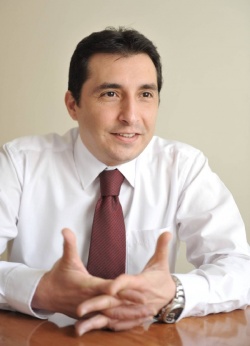Malta’s Saint James Hospital Group
Embarking on any business enterprise is never a small feat, but when that business is healthcare the task becomes gargantuan – and even greater if opening a healthcare facility in a country where the economies of scale create immediate difficulties. There’s also the problem of the main competitor being the free-of-charge public sector.

Planning and forecasting budgets is thus tough, since private healthcare receives neither government tax rebates nor any other possible incentives. Against that backdrop, EH Correspondent Moira Mizzi reports on a brave entrepreneurial achievement.
However, drawing together every professional, including top management, to adhere to hospital protocols, standards and guidelines is no day in the park – particularly since the staff includes full timers, part-timers and self employed workers, the majority of the latter being medical specialists. Resistance to change, usually stemming from fear of the unknown, is humungous and among the limiting factors that work against progress. Evidence based practice, nowadays widely used abroad, is far from local implementation, perhaps
mainly because the local Health Care Service does not have the necessary solid and comprehensive restructuring programme.
Setting up such a structure is among this young, enterprising general manager’s top priorities; he believes only then can the hospital function with a degree of responsibility, reliability and accountability, qualities of tantamount importance in a sector catering for highly vulnerable people. However, although all the required guidelines and protocols have been drafted for some time, unfortunately implementation is proving difficult.
For the group to function well another two important factors need consideration, Brian Bondin believes. First, the group needs to cater for the needs of patients and medics using the hospital facilities and see them both as clients; a specialist using the Group’s facilities needs to feel safe and confident that the apparatus he uses and the supporting staff are up to a professional standards; the patient believe this is the best service he can pay for and his rights and stricken projects.
The recent legislation obliging employers to allow both vacation and sick leave to casual workers did not help to alleviate this, not to mention the marked increase in the financial burden created. Despite this slippery and difficult grounding, Saint James Hospital Group can pride itself with innovative improvements in management systems and cost reduction strategies. The Medical Advisory Committee, which monitors the performance of medical staff and assists management to take certain business decisions, is one such measure. The recently revamped Purchasing Department uses a tendering system to ensure the best price for the best product is clinched involving all parties before any specific medical equipment is purchased, thus curbing on wastage.
The Biomedical Engineering Department, a brain child of the new management, is an in-house department that maintains all medical equipment, conducts all preventive maintenance, incorporates schemes aimed at training staff to make the best use of equipment and supports entities such as the University of Malta in offering sponsorships for its interns to train on medical equipment. Mentoring facilities from the hospital are also offered to the Faculty of Nursing and the European Society of Physiotherapists.
An in-house barcoding system of all entities within the group, including the patients, is also being set up to induce further accountability, traceability and costeffectiveness within the enterprise. One new challenge for the Group burden on the National Health Service. (In Malta only a small percentage of the population is privately insured). One possible incentive could be that Private companies that offer employees private health insurance be given advantageous tax rebates and credits.
A proper Public Private Partnership has to be set up, especially in a country such as Malta that cannot afford to waste money on duplicating efforts and services. Governments will need to explore further the possibilities to subcontract their services to the Private sector, especially when recent studies and analysis prove that Private Healthcare is run more cost effectively than any government facility. Private Healthcare should become more focused on specialisation rather than generalisation thus continuously attracting patients who yearn for highly professional and personalised care.
For the next decade, offering a top-notch service will be the challenge for all private healthcare facilities; this will include facing new technology that will make health less labour intensive and more technically involved. Governments should be the ‘Change’ agents of the future, the catalysts against bureaucracy, paving the way for technical advances and to legislate in favour of the patients’ well being. One day all of us will need one type of healthcare service or another. Therefore, all today’s health administrators and healthcare professionals should ensure that the possible service needed in a couple of years’ time will be what they are hopefully striving to improve and not allow it to deteriorate or worse – disintegrate.
25.05.2012





